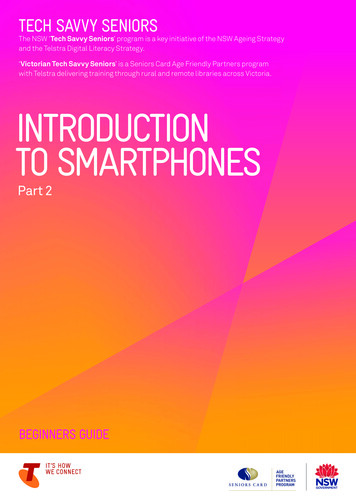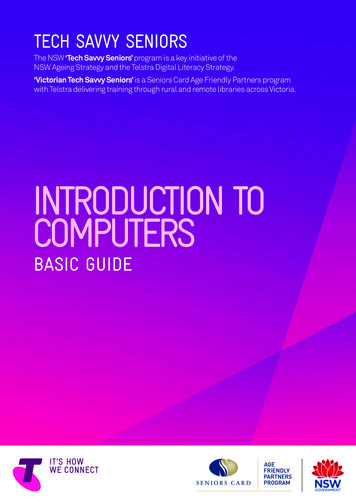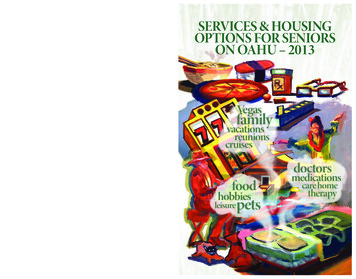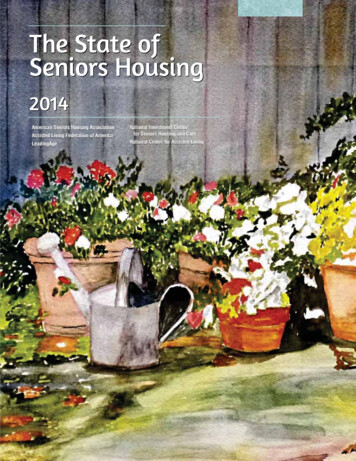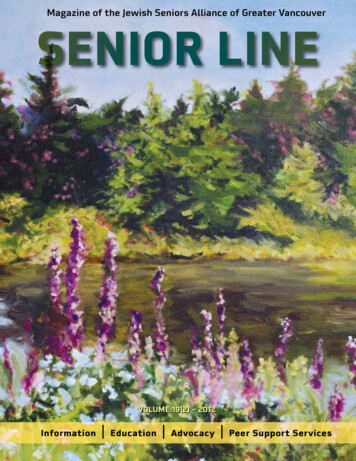
Transcription
SENIORS’ GUIDE FORLOWER MANHATTANPREPARED BYMANHATTAN COMMUNITY BOARD 12010The City ofNew York
The Seniors’ Guide of Manhattan Community Board 12010IntroductionWith increases in lifespan and quality of living for residents,many have chosen to remain in or come to New York City for theirsenior years. The New York City Department for Aging estimates thatseniors will outnumber school‐aged children in New York City by 2030.Is our own community accommodating such a shift? What doesour community already provide for seniors? What follows is ourattempt to provide the first guide for seniors living in ManhattanCommunity Board 1, which covers Lower Manhattan south of CanalStreet.In housing, our community board currently has two senior livingfacilities. There are also a number of buildings where many havechosen to age in place downtown. As more make this choice, we’veseen the creation of local senior centers and services, which addresssenior needs in areas of health, safety, and transportation at moderatecost or free of charge.With this guide, we hope to provide useful information for thosewho choose to live in our area during their senior years. It is our hopethat the Seniors' Guide for Lower Manhattan will not only assistindividuals, but also help maintain our community as one thatwelcomes and cares for its deserving seniors.This guide was initiated and led by Community Board 1 memberTom Goodkind. He was assisted in the project by Community Board 1’sCommunity Liaison, Yume Kitasei; Manhattan Borough President’sOffice Urban Planning Fellow for Community Board 1, Matt Viggiano;and a team of other Community Board 1 members and districtresidents who volunteered their time to the development of thisguide.Julie MeninChairperson
The Seniors’ Guide of Manhattan Community Board 1Part I – Housing & Centers for Seniors2010TABLE OF CONTENTSPART I ‐ HOUSING & CENTERS FOR SENIORS . 2 SENIOR LIVING FACILITIES IN COMMUNITY BOARD 1 .2AGING IN PLACE THROUGH SENIOR CENTERS .5PART II. RESOURCES FOR HEALTH & SAFETY . 10 HEALTH CENTERS & PROGRAMS FOR SENIORS & CAREGIVERS . 10HOME CARE & SERVICE PROVIDERS . 19SPECIAL HEALTH ISSUES . 23EXERCISE . 23SAFETY: LEGAL HELP AND INFORMATION . 24OTHER HEALTH‐RELATED RESOURCES . 26DRUG STORES . 29PART III. TRANSPORTATION BENEFITS FORSENIORS . 31 WALKING. 32DRIVING . 34TRANSPORTATION BENEFITS FOR SENIORS . 36ASSISTED TRAVEL WITHIN CB1 NEIGHBORHOODS . 37PART IV. LOCAL CLUBS & ORGANIZATIONS . 41 PROGRAMS FOR SENIORS. 41ADVOCACY GROUPS (NOT LISTED ABOVE). 49OTHER USEFUL WEB SITES AND PHONE NUMBERS . 50This guide was assembled through the hard work of a small group ofvolunteers. The information contained below may be subject to changeafter release of this guide. If you notice any inaccuracies, please submitcomments to the Community Board 1 office by emailingman01@cb.nyc.gov or by calling 212‐442‐5050.Photo on cover by Terese Loeb Kreuzer
The Seniors’ Guide of Manhattan Community Board 1Part I – Housing & Centers for SeniorsPart I ‐ Housing & Centers for Seniors‐2‐2010
The Seniors’ Guide of Manhattan Community Board 1Part I – Housing & Centers for Seniors2010Part I – Housing & Centers for Seniors:A Summary of Contents & ContactsSENIOR LIVING FACILITIES IN COMMUNITY BOARD 1 p. 31. The Hallmark of Battery Park City (p. 3)212‐791‐25002. St. Margaret’s House (p. 4)212‐766‐8122AGING IN PLACE THROUGH SENIOR CENTERS . p. 51. Independence Plaza (p. 6)212‐267‐04992. Southbridge (p. 6)212‐732‐93633. Center on the Square (p. 7)212‐777‐35554. First Presbyterian Church (p. 7)212‐924‐28105. Our Lady of Pompei Church (p. 8)212‐989‐36206. Greenwich House (p. 8)212‐242‐41407. The Educational Alliance (p. 8)212‐780‐23008. New York City Housing Authority (p. 9)212‐306‐3000 SENIOR LIVING FACILITIES IN COMMUNITY BOARD 11. The Hallmark of Battery Park City455 North End AvenueNew York, NY 10282212‐791‐2500Contact: Cheryl Bambach – Sales parkcity.aspxThe Hallmark is a 14‐story, 217‐unit facility for seniors. It ispredominantly dedicated to independent living, but does have an‐3‐
The Seniors’ Guide of Manhattan Community Board 1Part I – Housing & Centers for Seniors2010assisted living section on its 2nd floor. There is an assessment processfor those seeking to move to the Hallmark that examines an applicant’scognitive and physical ability. The process is used to evaluate any extraneeds and an applicant’s overall compatibility with the programsavailable.Monthly rent ranges from 5,550 ‐ 5,720 for a studio, 5,900 ‐ 7,230for a one bedroom, and 7,740 ‐ 8,900 for a two bedroom. Residentsmust sign an annual contract with the Hallmark. The rent includes 5breakfasts a week, 5 dinners a month, and utilities. Cable and phoneare not included and must be paid for separately by the tenant.Depending on the outcome of the assessment, extra medical andpersonal care services may also be provided. Avondale Group canprovide such care at a monthly cost (including 18 an hour, limited to6 hours per day assistance), though services may also be arranged withother groups. Services provided by Avondale Group include: Assistance with personal hygiene such as dressing and grooming;Full bath supervision and assistance;Assistance with ambulation;Reminders to take self‐administered medication;Apartment cleaning;Changing of bed linens;Laundering;Escorting within the community, meals, and activities;A night clerk or overnight care for incontinence; andIndirect care including observation and supervision, orientationand redirection, activities, socialization, companionship.2. St. Margaret’s House49 Fulton StreetPeck Slip, NY 10038212‐766‐8122Contact: Clair Guerette ‐ ts‐4‐
The Seniors’ Guide of Manhattan Community Board 1Part I – Housing & Centers for Seniors2010St. Margaret's House near the South Street Seaport is a 20‐story, 251‐unit facility designed for independent living for seniors age 62 andolder and mobility‐impaired adults age 18 and older. Eligibility islimited to certain Department of Housing and Urban Development(HUD) income guidelines. For example, as of May 2010, eligibility foran individual living in a one bedroom would be limited to only thoseearning less than an annual income of 43,000. St. Margaret's House issponsored by the Parish of Trinity Church and operated under theHUD regulations, and funded through the HUD Section 8 (202)housing assistance program.All apartments are carpeted and include a refrigerator, stove, air‐conditioning units, and an emergency pull cord. Rent includes heatand gas and is calculated such that it does not exceed 30% of thehousehold income. Electricity, telephone and cable charges are notincluded in the rent and must be paid directly to the companyproviding the service. Tenants receive one full meal per day in thedining room for which they pay a set fee not included in the rent.On‐site amenities include an atrium, garden, library, and 24‐hourentryway security. Tenants may also take part in organized activitiesincluding computer classes, Resident Council committee meetings,knitting, poetry, reading, and an occasional concert. Special holidayevents are scheduled for resident enjoyment. AGING IN PLACE THROUGH SENIOR CENTERSA naturally occurring retirement community (“NORC”) occurs when asignificant portion of a building or area that was not specificallydesigned with seniors in mind evolves towards a higher than averagenumber of senior residents. A NORC supportive service program(“SSP”) allows seniors to age in place with many of theaccommodations of a senior center. Funded in various ways, NORC‐SSPs, when successfully managed, can help prevent, mitigate, orreverse the negative impact on health and well‐being of aging alone.In the Community Board 1 area, we have two areas of senior‐5‐
The Seniors’ Guide of Manhattan Community Board 1Part I – Housing & Centers for Seniors2010living, while not officially designated as NORCs by New York City orState, have combined with the services of a senior center, reflecting theNORC‐SSP model.Popular Senior Centers Near Community Board 11. Independence PlazaServiced by the Caring Community310 Greenwich Street – 2nd FloorNew York, NY 10013212‐267‐0499Contact: Nicole Brown – Center zaOpen to all seniors 60 and over whether or not they live inIndependent Plaza North (“IPN”), the IPN SSP run by the CaringCommunity has a membership of nearly 1,000 seniors. It offers lunch,transportation services, exercise, yoga, art, games, and discussiongroups.Health assistance is also provided by Metropolitan Jewish GeriatricHealth System in the form of 7 nurses who come every Thursday from1:30‐3:30pm to the Caring Community at IPN. The nurses providelectures on subjects such as nutrition. Any home care provided at IPNmust come from outside sources.2. SouthbridgeServiced by the Southbridge Adult and Senior Citizens Center90 Beekman StreetNew York, NY 10038212‐732‐9363Contact: Chris Mitsopoulos – Coordinatorsouthbridgetowers.comThe Southbridge Adult and Senior Citizens Center offers a variety ofrecreational and cultural programs for seniors in the downtown area.‐6‐
The Seniors’ Guide of Manhattan Community Board 1Part I – Housing & Centers for Seniors2010The Center offers assistance with social services such as Medicare,Access‐A‐Ride, and Meals‐On‐Wheels. It also provides a shopping vanservice. There is a nurse available on premise every day and a socialworker from Tuesday through Friday. Members of the center enjoy awide range of recreational activities, including health and fitnessprograms, arts and crafts, knitting, Yiddish conversation, drawing,chess, games, and snacks. Membership is 8.00 for the year (thoughpayment of the fee is flexible) and is open to anyone over 55 in thedowntown area.3. Center on the SquareServiced by the Caring Community20 Washington Square NorthNew York, NY 10011212‐777‐3555Contact: Laura Marceca – reThe Center on the Square is open Monday through Friday from 9am‐5pm and located in a historic brownstone on Washington Square inGreenwich Village. The center offers a wide variety of classes andactivities and serves lunch every weekday. The building also has acomputer lab.4. First Presbyterian ChurchServiced by the Caring Community12 West 12th StreetNew York, NY hurchThis center was closed in June 2010 as result of New York City budgetcuts.‐7‐
The Seniors’ Guide of Manhattan Community Board 1Part I – Housing & Centers for Seniors20105. Our Lady of Pompei ChurchServiced by the Caring Community25 Carmine StreetNew York, NY 10014212‐989‐3620Contact: Sandy Gabin – ChurchThe church’s center is open Monday through Friday from 9am‐5pm. Itoffers lunch every weekday, as well as a variety of classes and activities,internet access, and regular day trips.6. Greenwich HouseJudith C. White Senior Center27 Barrow Street – 3rd FloorNew York, NY enior/jcwseniorThe Judith C. White Senior Center is open Monday through Fridayfrom 8:45am–4pm. It offers breakfast and lunch every weekday, as wellas a variety of classes and activities, referrals for medical and housingneeds, and regular day trips such as trips to shows.7. The Educational AlliancePrograms for Older Adults197 East BroadwayNew York, NY 10002212‐780‐2300www.edalliance.orgThe Alliance offers a wide range of programs from exercise to wellnessto housing advocacy. It has 6 different programs and locations acrossdowntown slightly north of the Community Board 1 area. Either call orvisit the web site for further information.‐8‐
The Seniors’ Guide of Manhattan Community Board 1Part I – Housing & Centers for Seniors2010Other Senior Centers in New York City8. New York City Housing Authority (NYCHA)Senior Centers in Manhattan250 BroadwayNew York, NY cschtml/seniorcenters manhattan.shtmlNYCHA provides a listing of the senior centers they sponsor inManhattan on their web site.‐9‐
The Seniors' Guide of Manhattan Community Board 1Part II. Resources for Health & SafetyPart II. Resources for Health & Safety‐10‐2010
The Seniors' Guide of Manhattan Community Board 1Part II. Resources for Health & Safety‐11‐2010
The Seniors' Guide of Manhattan Community Board 1Part II. Resources for Health & Safety‐12‐2010
The Seniors' Guide of Manhattan Community Board 1Part II. Resources for Health & SafetyThis map only contains those services located within the Community Board 1 Manhattancatchment area.‐13‐2010
The Seniors' Guide of Manhattan Community Board 1Part II. Resources for Health & Safety2010Part II – Resources for Health & Safety:A Summary of Contents & ContactsHEALTH CENTERS & PROGRAMS FORSENIORS &CAREGIVERS . p. 161. Social Security Office (p. 16)800‐772‐12132. Center for Medicare And Medicaid Services (p. 16)212‐616‐22053. New York City Department for the Aging (DFTA) (p. 16)212‐442‐30864. Hamilton‐Madison House (p. 16)212‐788‐23185. American Indian Community House (p. 18)212‐598‐01006. Friends and Relatives of Institutionalized Aged (FRIA) (p. 18)212‐732‐44557. Japanese American Social Service (p. 18)212‐442‐15418. New York Downtown Hospital (NYDH) (p. 19)212‐312‐5000HOMECARE & SERVICE PROVIDERS . p. 191. Better Helpers, Inc. (p. 20)212‐431‐80162. Chinese Planning Council Home Attendant Program (p. 20)212‐219‐81003. Concerned Home Managers for the Elderly, Inc. (COHME) (p. 21)212‐514‐71474. Metropolitan Council on Jewish Poverty (p. 21)212‐453‐95005. New York Foundation for Senior Citizens (p. 21)212‐962‐75596. Beth Israel Hospital ‐ Senior Health House Calls (p. 22)212‐206‐1299SPECIAL HEALTH ISSUES . .p. 231. NYS Commission for the Blind and Visually Handicapped (p. 23)212‐825‐57102. Center for Hearing and Communication (p. 23)917‐305‐7700‐14‐
The Seniors' Guide of Manhattan Community Board 1Part II. Resources for Health & Safety2010Part II – Resources for Health & Safety:A Summary of Contents & Contacts(continued from previous page)EXERCISE . . .p. 231. Health and Wellness Division, DFTA – Exercise Program (p. 23)212‐442‐0954SAFETY: LEGAL HELP AND INFORMATION .p. 241. New York County District Attorney’s Office:Elder Abuse Program (p. 24)212‐335‐89222. MFY Legal Services (p. 25)212‐417‐37003. Take Care New York/Department Of Health And Mental Hygiene(DOHMH) (p. 26)212‐863‐7718OTHER HEALTH‐RELATED RESOURCES .p. 261. NY Health Access (p. 26)518‐462‐68312. New York City Human Resource Administration (HRA) (p. 27)212‐331‐51603. New York State Health Insurance Resource Center –Long‐Term Care(p. 27)212‐480‐52424. Technology for Long‐Term Care (p. 28)212‐264‐4600DRUG STORES . . p. 291. Battery Park City Pharmacy (p. 29)212‐912‐05552. Broadway Downtown Pharmacy & Surgical Supply Inc. (p. 29)212‐925‐48883. Downtown Pharmacy (p. 29)212‐233‐03334. Duane Reade (p. 30)866‐375‐69255. Kings Tribeca Pharmacy (p. 30)212‐791‐31006. Rite Aid (p. 30)800‐748‐3243‐15‐
The Seniors' Guide of Manhattan Community Board 1Part II. Resources for Health & Safety2010 HEALTH CENTERS & PROGRAMS FOR SENIORS &CAREGIVERS1. Social Security Office26 Federal Plaza – 31st FloorNew York, NY 10278800‐772‐1213www.ssa.gov/pgm/ links retirement.htmThe federal retirement benefits office is conveniently locateddowntown.2. Center for Medicare and Medicaid Services26 Federal Plaza – 38th FloorNew York, NY 10278212‐616‐2205www.cms.govThis center is run by the U.S. Department of Health and HumanServices and is conveniently located downtown.3. New York City Department for the Aging (DFTA)Health Promotion Unit2 Lafayette StreetNew York, NY 10007212‐442‐3086www.nyc.gov/html/ dfta/html/health/ health.shtmlOne of the goals of DFTA is to encourage seniors to follow a healthierlifestyle. The Health Promotion Unit provides a vast array of servicesto educate seniors and promote good health practices.4. Hamilton‐Madison House100 Gold Street‐16‐
The Seniors' Guide of Manhattan Community Board 1Part II. Resources for Health & Safety2010New York, NY 10038212‐788‐2318 for general information212‐788‐1537 for Adult Day Carewww.hmhonline.org/ defaultLanding.htmSeniors 60 and over are eligible for this program.Hamilton‐Madison House assists the Southbridge Adult and SeniorServices Center on 90 Beekman Street at 212‐267‐0521 by providinghealth care services at no fee to seniors living in Southbridge Towerswith services allowing them to remain in their homes. This serviceincludes benefit and entitlement assistance and supportive counselingMonday through Friday, 9:30am‐5:30pm. Walk‐in hours are Tuesdayand Friday from 10am‐3pm.The Hamilton‐Madison Social Adult Day Program at the lower level of100 Gold Street at 212‐788‐1537 assists those with memory loss andprovides support to their caregivers and family members. It offersmeals, assistance with personal care, and medication reminders, aswell as trips and recreational activities. It has a minimum agerequirement of 55. There is no formal dementia requirement and theydo not accept clients who are incontinent. Their hours are Monday,Tuesday, and Friday from 9:30am‐3:30pm. They do not acceptMedicare or Medicaid, but they do take Managed Medicaid (VisitingNurse Service Choice), and their private pay daily rate is 50. Round‐trip transportation is available at a cost of 10 within Manhattan and 15 from Brooklyn.Their Caregivers Program, also located on the lower level of 100 GoldStreet, assists with benefits & entitlements, respite, home care, adultday care, and training. They can be contacted at 212‐788‐1688.Both programs located at Gold Street have bilingual Chinese/Korean‐English speaking geriatric specialists.‐17‐
The Seniors' Guide of Manhattan Community Board 1Part II. Resources for Health & Safety20105. American Indian Community House11 BroadwayNew York, NY 10004212‐598‐0100Contact: Kim Randallwww.aich.orgThe American Indian Community House is for Native Americans of allages and provides health education, medical and dental referrals,community outreach, and the development of Native American‐specific health‐oriented programs. Other programs administered bytheir Health Department include mental health, food and clothingbanks, and free hot lunches daily during the weekdays for any memberof the public.6. Friends and Relatives of Institutionalized Aged (FRIA)18 John Street – Suite 905New York, NY 10038212‐732‐4455www.fria.orgThis non‐profit agency is dedicated to making sure individuals in long‐term care facilities receive adequate, timely, appropriate, andcompassionate care. They organize family groups, put outpublications, and offer hotline assistance for consumers concernedabout the nursing home and assisted living industries.7. Japanese American Social Services100 Gold StreetNew York, NY htmlJapanese American Social Services, Inc. (JASSI) is a non‐profitorganization established in 1981 to address the social services needs of‐18‐
The Seniors' Guide of Manhattan Community Board 1Part II. Resources for Health & Safety2010persons of Japanese ancestry in the Greater New York area. The seniorprogram provides services for seniors 60 and over. JASSI’s seniorcitizens program includes case management, home visits, obento(boxed lunch) delivery, the distribution of free tickets to culturalevents, monthly get‐togethers ranging from seminars on relevanttopics to luncheons with speakers, outings to historic sites, andholiday celebrations.8. New York Downtown Hospital (NYDH)170 William StreetNew York, NY 10038212‐312‐5000www.downtownhospital.orgNYDH has begun working with Southbridge Adult and Senior CitizensCenter (see page 6 for a description of Southbridge Towers) to designhealth programs, and a medical office has been established atSouthbridge. This is a collaborative effort by the community’smanagement agency, nurses, and other groups.NYDH provides care on‐site at housing complexes throughout LowerManhattan.Their Home Visit Program and Visiting Doctors program also providescare for homebound seniors. HOME CARE & SERVICE PROVIDERSHome care & service providers allow Lower Manhattan residents to agein place (also see above, New York Downtown Hospital, for variousvisiting services – nurses, doctors and home attendants).‐19‐
The Seniors' Guide of Manhattan Community Board 1Part II. Resources for Health & Safety20101. Better Helpers, Inc.401 Broadway – Suite 1507New York, NY r-helpers-incBetter Helpers provides New York State licensed home care includingaides, attendants, registered nurses, and 24‐hour live‐in assistance.2. Chinese Planning Council Home Attendant Program1 York Street – 2nd FloorNew York, NY 10013212‐219‐8100Contact: Ling Mawww.cpc-ny.org/home a.htmThis program is a not‐for‐profit that uses registered nurses and casecoordinators.Serving mostly residents of Chinatown and the Lower East Sidethrough Medicaid, the program works with clients, their families, andphysicians in tailoring home care plans: hot meal preparation,maintenance of a hygienic and safe environment, observation of basichealth and mental health status, assistance with getting around, andcompanionship.The Chinese Planning Council manages two senior centers inChinatown at 168 Grand Street and 70 Mulberry Street, as well asothers.3. Concerned Home Managers for the Elderly, Inc. (COHME)11 Broadway – Suite 400New York, NY 10004212‐514‐7147www.cohme.org‐20‐
The Seniors' Guide of Manhattan Community Board 1Part II. Resources for Health & Safety2010This group is a New York State licensed non‐profit home care providerwith services such as New York State licensed clinical social workermanagement, registered nurse visits, bathing and feeding assistance,housekeeping, and grocery shopping all facilitating aging in place.4. Metropolitan Council on Jewish Poverty80 Maiden Lane – 21st FloorNew York, NY erverThe non‐profit Met Council serves those in need regardless of race,ethnicity, or background. Many senior services are provided at low orno cost.Their Home Care Providers program (212‐453‐9688) helps seniors withpersonal care, shopping, light housekeeping, meals, and escorts forappointments. They provide social worker intake, phone check‐ins,and care management.Their Home Services program (212‐453‐9525) provides home repair andmaintenance such as caulking, door and lock repairs, installation ofsafety rails, outlet repair, changing light bulbs, toilet repair, and minorpatching of walls and ceilings.5. New York Foundation for Senior Citizens11 Park Place – 14th FloorNew York, NY 10007212‐962‐7559www.nyfsc.orgNew York Foundation for Senior Citizens is a non‐profit organizationserving those in all 5 boroughs. They house a home attendant programserving over 800 seniors. Funding for this program is provided by NewYork City Human Resources Administration. Case management is‐21‐
The Seniors' Guide of Manhattan Community Board 1Part II. Resources for Health & Safety2010provided for no fee and includes coordination of home care and otherservices for physically and mentally impaired residents in CommunityDistricts 1‐5. There is also a home sharing program, which screens andmatches applicants for compatibility. A respite care program offerstrained and certified home attendants. There are home repair servicesand home safety audits to help seniors maintain independent livingprovided free for those in need. The home safety audits can identifypotential hazards such as loose throw rugs, no grab bars, phone cordsand obstructing extension wires and encourage seniors to make thechanges themselves, or refer them back to the program for free repairs.6. Beth Israel HospitalSenior Health House Calls275 Eighth AvenueNew York, NY 10011212‐206‐1299wehealny.org/patients/BI home/Bi index.htmlPreviously supported by and working with St. Vincent’s Hospital, thisprivate organization is now partnering with Beth Israel Hospital.This is a visiting doctors program for homebound elderly thatrecognizes the growing need in NYC for geriatric home care. TheSenior Health House Call service is not located in the CB1 district, butprovides a rare and valuable service anywhere south of 59th Street,including to residents of Community Board 1. It began service in 2009,and in its first year, has taken care of over 100 patients.Medicare typically provides coverage. For those not covered byMedicare, insurance has been known to cover costs although it’s not apart of HMOs. They will also provide speakers on geriatric issues ifrequested by an organization.The program has a geriatric health care team consisting of a physician,a nurse practitioner, a social worker, and a coordinator ‐ all of whomhave expertise in addressing the complex needs of older patients.‐22‐
The Seniors' Guide of Manhattan Community Board 1Part II. Resources for Health & Safety2010 SPECIAL HEALTH ISSUES1. NYS Commission for the Blind and Visually Handicapped80 Maiden Lane – 23rd FloorNew York, NY HThis NY State Commission provides an Adaptive Living Program forpeople over 55 who need training and services to be able to remainliving at home. Their program provides services through not‐for‐profitprivate organizations and from ophthalmologists and optometristswho are certified as low vision specialists. These services are providedbased on individual need and may include orientation and mobilityservices, rehabilitation teaching, low vision services and devices, socialcasework, and adaptive equipment.2. Center for Hearing and Communication50 Broadway – 6th FloorNew York, NY 10004917‐305‐7700www.chchearing.orgThis non‐profit has been providing hearing rehabilitation and humanservices regardless of age or ability to pay since 1910. EXERCISE1. Health and Wellness Division, New York City Department forthe Aging (DFTA) – Exercise Program2 Lafayette StreetNew York, NY alth/health.shtml‐23‐
The Seniors' Guide of Manhattan Community Board 1Part II. Resources for Health & Safety2010The DFTA Health Promotion Unit provides an array of services toeducate and promote good health practices. Senior volunteers aretrained to lead health promotion activities at senior centers and othersites throughout New York City. Seniors can inquire which centersoffer these programs in our community by calling the number listedabove or visiting the web site.The programs include exercise classes, discussion groups, bloodpressure monitoring and walking clubs. The Health Promotion staffprovides on‐site training and all necessary equipment for theseactivities. There are also free lectures on health education for issuesthat concern senior groups, including cardiovascular disease, diabetes,fall prevention, medication management, insomnia and memory.They offer a Stay Well Exercise manual for seniors of all abilities.Presented in a user‐friendly layout, the book offers numerous optionsfor anyone 60 or over seeking to exercise at home. They provide onecopy per request and can mail a manual to your home. To see asample online, use the following web site:www.nyc.gov/html/dfta/downloads/pdf/stay well look.pdf SAFETY: LEGAL HELP AND INFORMATION1. New York County District Attorney’s Office: Elder AbuseProgramOne Hogan PlaceNew York, NY irs/brochures/Protecting Elderly.pdfThe Elder Abuse Program of the New York County District Attorney'sOffice addresses the needs and concerns of older crime victims wholive in Manhattan. In cooperation with the New York City PoliceDepartment, Protective Services for Adults, the NYC Department for‐24‐
The Seniors' Guide of Manhattan Community Board 1Part II. Resources for Health & Safety2010the Aging and other social service agencies, the office investigates andprosecutes cases involving elderly crime victims.This office defines elder abuse as any crime or violation involving avictim who is 60 or older. Examples of typical crimes committedagainst the elderly are domestic abuse or neglect at the hands of afamily member or partne
Health System in the form of 7 nurses who come every Thursday from 1:30‐3:30pm to the Caring Community at IPN. The nurses provide lectures on subjects such as nutrition. Any home care provided at IPN must come from outside sources. 2. Southbridge

